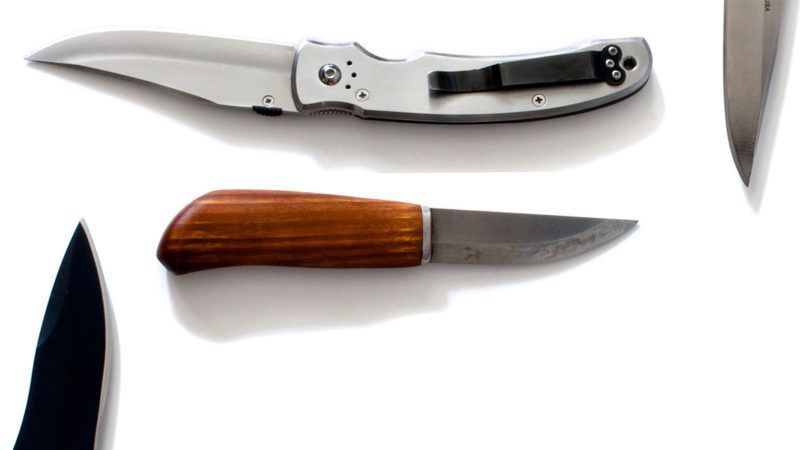In Praise of Pointy Things
The gifting of a knife is the entrusting of a reliable tool, perhaps the most useful one that humans have invented and can own.

To judge by conversations with friends and acquaintances over the years, my family isn't the only one to treat the gifting of a knife as a rite of passage. It's an acknowledgment that the recipient has passed a milestone, having become sufficiently familiar with spatial relationships and mortality to avoid severing anything too terribly important from themselves or others. It's also the entrusting of a reliable tool, perhaps the most useful one that humans have invented and can own.
I no longer have the first knife I received—a somewhat unwieldy device that included a fork and spoon—but I still own the Colonial Forest Master camp knife that I bought on an elementary school field trip to Bushkill Falls ("the Niagara of Pennsylvania"). My classmates and I pretty much cleaned out a box of them in the gift shop as our teachers patiently waited for us to snap up our souvenirs. The little folder is a bit worn these days and the blade has a few chips out of it. That's because it was put to hard use over decades of whittling, repairing, cutting twine, and opening packages.
People are skittish about knives these days. Government officials in the United Kingdom have moved on to restricting blades after discovering that gun control wasn't the crime eradicator they'd imagined. Now the Brits are seriously considering banning points on kitchen cutlery. The assumption, apparently, is that nobody will rediscover the lost art of scraping hard objects against abrasive surfaces to reshape and sharpen them.
The fact is, it's not too difficult to make knives from scratch, as anybody who has seen History Channel's Forged in Fire knows.
"Let me show you this," my dentist said to me a year or so ago with a big grin. In the middle of my exam, he pulled out a shaving-sharp, fixed-blade knife that he'd made himself. For fun, he installed a forge in his workshop and has developed a truly dangerous set of skills (and fingers perhaps a bit larger than you might want to encounter during a dental exam).
My nephew doesn't forge blades, but he frequents junk shops and flea markets looking for old steel files and rasps that he can grind to a fine edge. Originally self-taught, he's picked up pointers from a knifemaker.
In both cases, they're following in the footsteps of craftsmen who've created some of the most sought-after tools ever. How sought after? Early hominids were making chipped stone blades—called Oldowan tools—about 2.6 million years ago. Folding pocket knives date back at least 2,600 years to the Hallstatt culture of Central Europe. Pretty much any material that can hold an edge has been put to that purpose at one time or another.
People put in the effort to manufacture sharp edges and points because they're useful for skinning animals, cutting food, trimming cloth, splicing rope, stripping insulation, and a host of other purposes, including self-defense. Sometimes a specialized tool might do a job better, but knives can handle a host of tasks in one package. That's why they've held their place through all the changes in culture and technology that mark the evolution of human civilization.
Of course, any tool can be put to good uses, bad uses, or uses that are inconvenient for our would-be masters. Anticipating modern British officials, King Louis XIV of France banned the carrying of pointed knives in 1669 out of fear that his subjects were too dangerous (and indeed they were—to his deposed descendant, Louis XVI). He wasn't the first to make that effort, and I doubt today's London politicians will be the last.
Never mind the restrictionists. My son's collection of knives—like nearly all collections of knives—has grown since he received his first one as a gift; one of them is on his person pretty much all the time. Maybe his cousin or our dentist will give him a custom blade and he'll pass it on, along with the tradition of gifting a blade as a rite of passage. Like all good tools, knives aren't going anywhere so long as they prove their worth.


Show Comments (47)